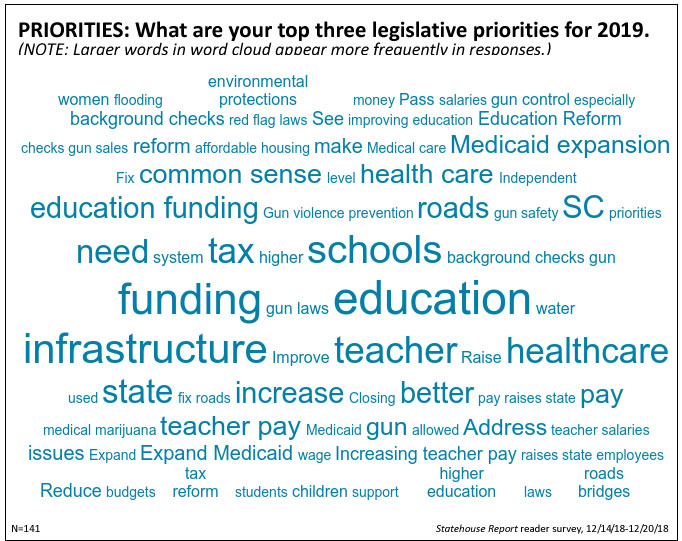
By Lindsay Street, Statehouse correspondent | A survey of Statehouse Report readers shows they, like state lawmakers, want education reform to be the legislature’s top priority in 2019.
But the survey, answered by 148 readers, showed key differences in priorities due to the publication’s engaged readership, according to one analyst. Readers want more focus also on issues like protecting infrastructure from flooding, reforming gun laws and expanding health care access
The session begins Jan. 8.
Over six days starting Dec. 14, the survey garnered 148 respondents, 40 percent of whom said they were Democrats. While only 10 percent identified themselves as Republicans, one in four said they were independents and about 20 percent simply said they were “interested in politics.” The rest did not answer indicate their political leaning.
Elizabeth S. Smith, chair of Furman University’s Politics and International Affairs Department, said a survey of readers is also likely to skew toward the “attentive public,” meaning these responders are well-informed on topics and do not typically represent the broader constituency.
Readers say state is headed in wrong direction
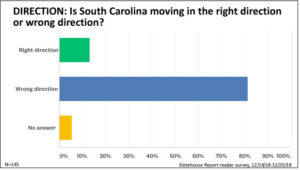 A vast majority of respondents — 81.9 percent — said the state was moving in the wrong direction. Of the 138 who answered the question, 50 issued a comment with education occurring in 62 percent of responses, infrastructure occurring in 34 percent of responses, and health care occurring in 28 percent of responses. Percentages were calculated by the number of occurrences over the number of responses.
A vast majority of respondents — 81.9 percent — said the state was moving in the wrong direction. Of the 138 who answered the question, 50 issued a comment with education occurring in 62 percent of responses, infrastructure occurring in 34 percent of responses, and health care occurring in 28 percent of responses. Percentages were calculated by the number of occurrences over the number of responses.
“Very little statesmanship evidenced in failure to properly fund education to remedy discrepancies in preparation, lack of sign on to Medicaid expansion, poor foresight in infrastructure and flood mitigation planning and funding, and failure to pass basic protections for citizens with regard to gun policies,” wrote reader Judy Hines of Charleston.
Another respondent who identified as an independent provided a similar comment:
“South Carolina needs to act to broaden health care, address infrastructure, and education. Not necessarily in that order.”
Among those who thought the state was going in the right direction, one Chapin woman said the economy was proof that the state is improving.
“Our economy is the basis of our strength. We are moving in the right direction and we are holding spending to a manageable limit,” she wrote.
Michelle Edgar of Columbia also had a rosy view of the state.
“We are getting more leaders elected that are empathetic with everyday citizens,” she wrote.
Others, such as Michele Baker of Beaufort, qualified their answer on the state’s direction.
“I chose the right direction because. in general, things tend to get better, but there are some serious problems still out there like the education system, state employee pay/benefits, offshore drilling that need to be remedied,” she said in the survey.
Challenges facing the state
More than one-third of responses from readers included mentions of infrastructure and roads as among South Carolina’s greatest challenges.
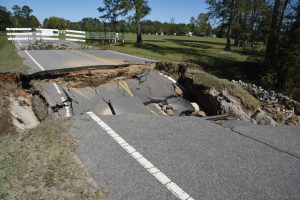
“Our roads are terrible,” one respondent wrote.
Another third of responses also listed health care as another big challenge in the state.
“We need Medicaid expansion and we need more ACA [Affordable Care Act] marketplace options,” Kristen French of North Charleston wrote.
Nearly 25 percent of responses listed teachers, education, schools or other items as challenges for the state.
“Deplorable educational statistics … poor teacher retention and embarrassing teacher pay scales,” Cyndie Geries of Hartsville wrote.
Fewer than 12 percent of comments identified environmental, flooding or climate change as a significant challenge to the state.
Hines was among those talking about climate change and the challenges for the state. She asked for “long-term planning.” Others said the state needed to find a way to reduce fossil-fuel dependency and invest in alternative energy such as solar.
Education tops legislative priorities
Furman’s Smith said the public has led the charge on pushing education to the top of lawmakers’ agendas for the coming session, and the reader survey showed similar results.
More than 73 percent of responses to a question asking respondents to list their top three priorities included mentions of education. While lawmakers and the media often sent the issues agenda in public policy debates, education hits closer to home for more people, Smith said.
“That’s the kind of issue where the public has an easier time forming an opinion themselves and can be the drivers in making the difference … With efforts by educators particularly, putting pressure on state legislature, that has been more of a citizen initiative. The public has gotten real fed up.”
Other top priorities among respondents included:
- Roads and infrastructure (30.37 percent);
- Health care, including expanding Medicaid (35.55 percent); and,
- Gun control (26.65 percent)
Redistricting, guns are top reform priorities
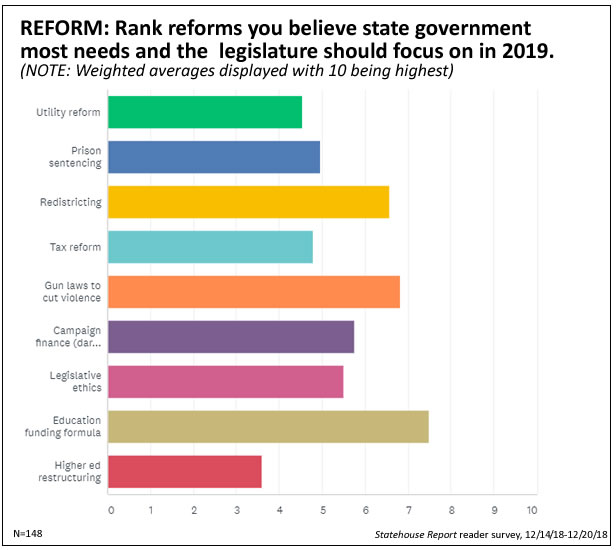
The survey then asked readers to prioritize a list of reforms the General Assembly should consider. While education, infrastructure, gun control and health care topped overall priorities redistricting reform ended up as readers’ highest reform priority.
“Fix redistricting and end gerrymandering,” one respondent wrote.
The next top reform priorities respondents identified were:
- Gun law reform;
- Education formula reform; and,
- Campaign finance reform, which includes limiting use of so-called “dark money” in politics.
Readers want more investment for education
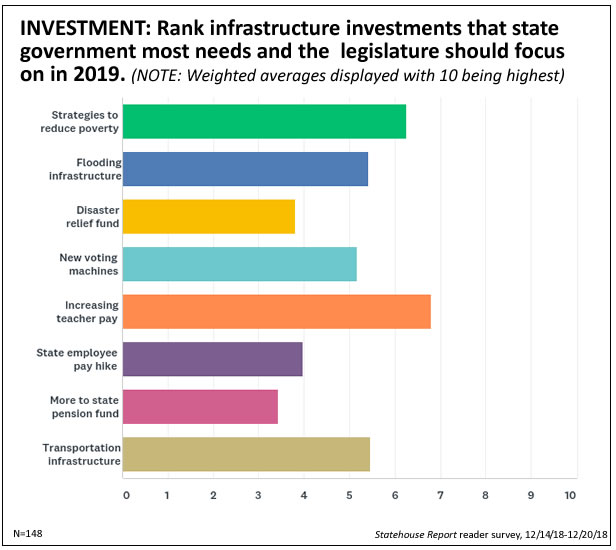
The survey asked readers to rank their main investment priorities in order of importance. Teacher pay topped their investment priorities. .
“Teacher salaries must keep pace with cost of living,” a respondent wrote. Another added, “Teacher pay is horrendous.”
- Last week, Statehouse Report’s editor and publisher called for a 5-percent pay hike for K-12 teachers. Click here to read the column.
Here are the other top investment priorities mentioned by respondents:
- Investing in strategies to reduce poverty;
- Investing in infrastructure to reduce flooding;
- Buying new voting machines; and,
- Investing more in transportation infrastructure
Politically-charged issues ranked
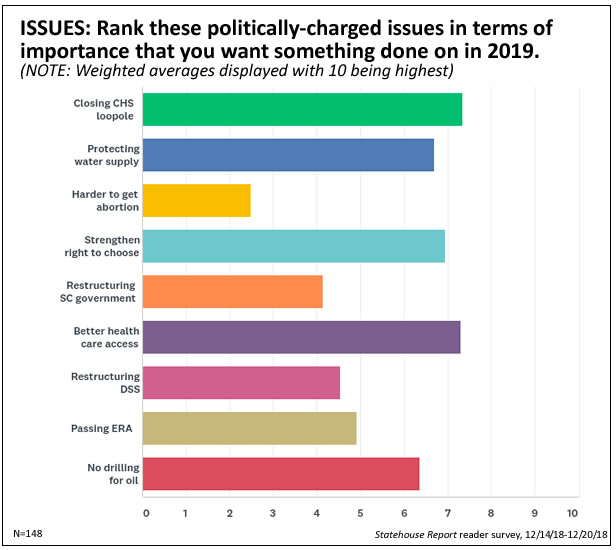
The survey also asked readers to rank their top four politically charged priorities, the things that could take up a lot of debate among lawmakers if they are brought to the floor at all.
While at least three lawmakers identified restricting abortion access as a top priority in 2019, readers seemed more interested in strengthening a woman’s ability to access abortion services. Abortion politics seems to take away from more important issues the state is facing, according to Sarah Hurst of Bluffton. She identified abortion politics among “stupid things” that take away from the focus on funding education.
Here are some other top politically-charged priorities for readers:
- Improving access to health care for poor people;
- Closing the Charleston loophole (“Strengthening our gun violence laws to prevent domestic violence murders and mass shootings,” a respondent wrote.); and,
- Protecting the state’s water resources.
- Have a comment? Send to: feedback@statehousereport.com



Thank for this. Easy to read and understand. We are making inroads on making progress with voters on issues that important to them , not to just the lawmakers.
Pingback: Session’s close drawing near with big items waiting for 2020 – Local Education News